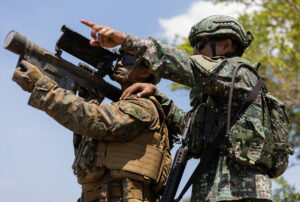By John Victor D. Ordoñez, Reporter
MANILA and Washington should pursue deeper ties and constant communications between their defense agencies to ensure the continuity of security engagements under a second Trump administration, security analysts said at the weekend.
“Establishing good personal relations between their defense chiefs is crucial to promote better consultation and coordination,” Lucio B. Pitlo III, a research fellow at the Asia-Pacific Pathways to Progress Foundation, said in a Facebook Messenger chat.
“This can help promote continuity of ongoing security engagements, clarify issues like concerns over military aid suspension and identify and reinforce shared interests and priorities,” he added.
Last week, US Defense Secretary Pete Hegseth spoke on the phone with his Philippine counterpart Gilberto Eduardo Gerardo C. Teodoro, Jr. to discuss boosting deterrence in the South China Sea amid rising tensions with China, according to the US Department of State.
Washington’s Defense chief reaffirmed Washington’s “ironclad” commitment to its Mutual Defense Treaty with Manila to secure peace in the Indo-Pacific region. He also vowed to work with Mr. Teodoro in boosting defense cooperation.
Manila has been embroiled in wrangles at sea with Beijing in the past two years and the two countries have faced off regularly around disputed features in the South China Sea that fall within Manila’s exclusive economic zone.
“There won’t be much of a radical shift under the Trump government despite the whole concept of transactionalism when it comes to recognizing the significance of the alliance,” Don McClain Gill, who teaches foreign relations at De La Salle University in Manila, said in a Facebook Messenger chat.
“As far as the defense angle is concerned, I do not think that there would be major obstacles in pushing this further under Trump 2.0,” he added.
The US Department of State on Jan. 20 issued an executive order that froze foreign funding, with exceptions for emergency food programs and military aid to Israel and Egypt.
US President Donald J. Trump ordered the 90-day pause in foreign development assistance pending a review.
Last month, US Secretary of State Marco Rubio talked about China’s “dangerous and destabilizing actions in the South China Sea” with Philippine Foreign Affairs Secretary Enrique A. Manalo and underscored the ironclad US defense commitment to Manila.
The US is the Philippines’ major security partner, with a 1951 Mutual Defense Treaty compelling both nations to defend each other in case of an armed attack.
Their air forces held joint patrols over the South China Sea last week, a move that angered China, which also conducted a “routine patrol” over the disputed Scarborough Shoal.
Beijing has accused its neighbor of joining patrols it said were organized by foreign countries to “undermine peace and stability” in the waterway.
Security engagements between the allies have soared under Philippine President Ferdinand R. Marcos, Jr., who has moved closer to Washington and allowed the expansion of military bases that American forces could access, including facilities facing the democratically governed island of Taiwan, which China claims as its own.
“I don’t think that the defense aspect of our partnership with the US would be derailed,” Mr. Gill said. “The economic development aspect is another story. But of course, that doesn’t paint the entire picture of the partnership we have with the US.”
The Philippines has contested China’s sweeping claims in the waterway through diplomatic channels by filing more than 190 diplomatic protests since Mr. Marcos took office in 2022.
